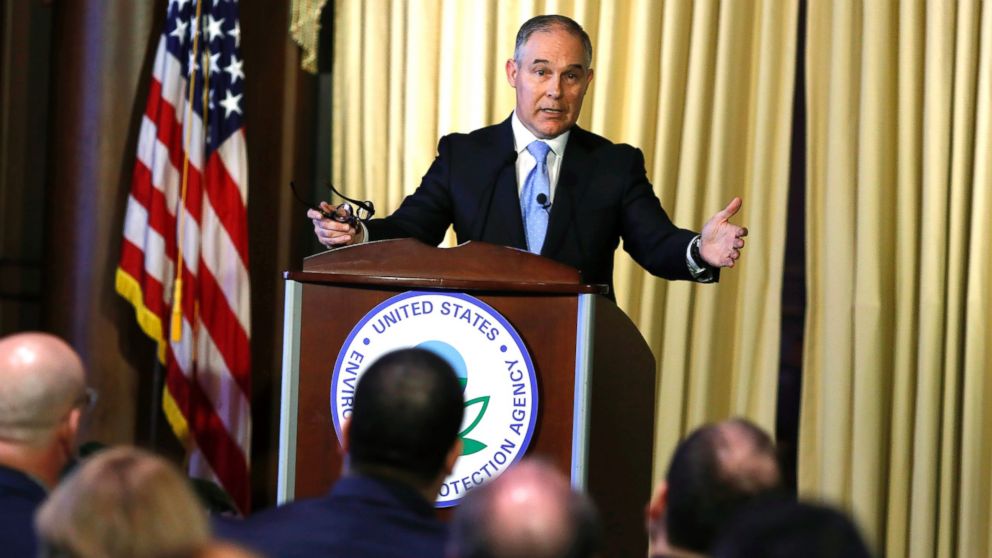


Scott Pruitt, the head of the Environmental Protection Agency, expressed doubt whether carbon dioxide from human activity is the primary cause of climate change, apparently contradicting the language used on his own agency's website.
"I think that measuring with precision human activity on the climate is something very challenging to do, and there's tremendous disagreement about the degree of impact," Pruitt said this morning in an interview with CNBC. "So no, I would not agree that it's a primary contributor to the global warming that we see."
The EPA's website plainly states that humans, by burning fossil fuels and emitting carbon into the atmosphere, have played a significant role in climate change.
"Since the Industrial Revolution began around 1750, human activities have contributed substantially to climate change by adding CO2 and other heat-trapping gases to the atmosphere. These greenhouse gas emissions have increased the greenhouse effect and caused Earth's surface temperature to rise. The primary human activity affecting the amount and rate of climate change is greenhouse gas emissions from the burning of fossil fuels," the site reads.
Pruitt, 48, who was Oklahoma's attorney general and whom opponents painted as a climate change denier and a risky choice to head the EPA, was narrowly confirmed by the Senate in February, 52 to 46 votes.
Democratic Sens. Heidi Heitkamp of North Dakota and Joe Manchin of West Virginia, who hail from states whose economies heavily depend on the energy sector, voted with Republicans to confirm Pruitt. Only one GOP senator, Susan Collins of Maine, voted against his confirmation.
New EPA head Scott Pruitt's emails indicate close ties to oil and gas producers Senate confirms EPA nominee Scott Pruitt despite a renewed court battleResponding to follow-up questions, a spokesperson with the agency told ABC News: "Administrator Pruitt has said repeatedly and consistently that he believes the climate is warming and that it is in part due to human activity. Many questions remain however that should be debated: how much is the climate changing, to what extent is human activity involved, and what to do about it?"
During the presidential campaign, Donald Trump promised to roll back Obama-era regulations aimed at reducing climate change as a way of bolstering the energy sector, and Pruitt was seen by his supporters as an ideal fit to fulfill those promises.
Today's remarks appeared to be a step back from language Pruitt used at his confirmation hearing in January.
"I do not believe that climate change is a hoax," Pruitt said at the opening statement of his hearing. "Science tells us that the climate is changing and that human activity in some manner impacts that change."
Later, in a tense exchange with Sen. Bernie Sanders, a self-described democratic socialist from Vermont, Pruitt said the EPA has a role to play in regulating CO2 emissions.
"Senator, I believe that the administrator has a very important role to perform in regulating CO2," Pruitt told Sanders.
The National Oceanic and Atmospheric Association would not comment on Pruitt's remarks today. Staffers at the NOAA pointed reporters to its research on the effects of carbon emissions on the atmosphere.
A Q&A on NOAA's website includes this question: "Can we avoid increasing climate change without dramatically lowering atmospheric CO2 emissions from fossil fuel burning?"
"The answer is essentially no," the site reads.
John O'Grady, who represents EPA employees through a large union, told ABC he was was "deeply saddened" when he heard about Pruitt's comments.
"Global climate change is the moral issue of our day, and the answer to addressing it appropriately does not lie with economic theories, ideologies or political parties. Rather, properly addressing global climate change promotes the general welfare and protects the poor and vulnerable, who are most affected and least heard," O'Grady wrote in an email.